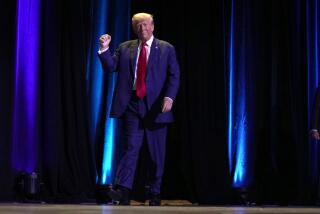Chances of Overturning Verdict Seen as Slim
- Share via
Although lawyers for convicted former Enron Corp. executives Jeffrey K. Skilling and Kenneth L. Lay have already announced that they will appeal Thursday’s verdicts, their chances for success are very small, legal experts said.
Appellate judges are generally reluctant to order re-runs of trials as long, expensive and intensely argued as this one, the experts said. Moreover, the prospects that either of the two men would prevail on specific issues they plan to raise are “extremely dim,” said Samuel W. Buell a University of Texas law professor and former member of the federal Enron Task Force, which investigated and prosecuted the case.
Skilling’s lead lawyer, Daniel M. Petrocelli, said he intended to file a series of motions, including one for a new trial, by a June 6 deadline. He and his team of 14 lawyers and six paralegals and aides will work throughout the summer on an appeal.
In announcing his appeal plans, Petrocelli cited a long string of court rulings adverse to the defense, and said a key issue would be the judge’s refusal to move the trial out of Houston.
“There are psychological and personal losses suffered here that simply don’t exist elsewhere,” Petrocelli said. “We pointed this out to the judge at the start when we sought a change in venue.”
UC Berkeley Boalt Hall law professor Franklin Zimring agreed that “everyone in Houston knows someone without a pension” or a job because of Enron’s collapse.
“If anybody has grounds to appeal on venue grounds,” he said, “Skilling and Lay might.”
But “what part of Antarctica should the trial have been held on?” he asked. “Who hasn’t heard of this?”
Zimring and other experts noted that U.S. District Judge Sim Lake was careful to exclude from the jury anyone personally affected by the corporation’s demise.
He also said appellate courts often give trial judges wide discretion on venue decisions especially when jurors said, as they did in this trial, that they could be fair.
Moreover, moving the trial out of Houston, where Enron was headquartered, would not have guaranteed an acquittal for Skilling or Lay.
Former WorldCom Inc. chief Bernard J. Ebbers was convicted on accounting fraud charges even though his trial was moved to New York from Mississippi, where WorldCom began as a small phone company.
Yet a Birmingham, Ala., federal jury acquitted HealthSouth Corp. founder Richard M. Scrushy of similar fraud charges last June involving the Birmingham-based health chain.
As a general matter, several legal experts said, appeal is always an unlikely proposition for the appellant, even more so after this high-profile contest.
“This was an incredibly expensive trial involving hundreds of thousands of man hours and millions of dollars,” said Scott Meyers, a Chicago securities lawyer.
“These types of cases are incredibly disruptive for judges,” he said. As a result, “the tendency is for courts to try and find a way to sustain the verdict.”
Moreover, “the trial was conducted very carefully by everybody involved,” Buell said. “There are no glaring mistakes that you can point to,” he said, citing Lake as “meticulous” in his conduct of the proceedings.
As a result, Buell added, lawyers are left with few specific grounds on which to argue on appeal.
Lake’s instructions allowing jurors to consider whether Skilling and Lay deliberately turned a blind eye to wrongdoing by Enron subordinates may be one basis for a new trial.
Petrocelli argued that the standard should have been whether fraud was committed and whether Skilling intended to defraud.
“This is always a problematic instruction because it goes to issues of intent,” Laurie L. Levenson of Loyola Law School said.
But whether Lay and Skilling had the required level of criminal intent is ultimately a question of fact for the jury, Meyers said. So long as there is enough evidence for the jury to decide this, “it almost never works to argue that the jury got it wrong,” he said.
Petrocelli also complained during the trial that the government thwarted defense efforts to obtain what he called exculpatory testimony from other former Enron executives who had not been charged with crimes. The witnesses refused to testify on self-incrimination grounds without a grant of immunity, he said.
However, as a general matter, Meyers said, “it happens all the time in criminal securities cases” that witnesses won’t testify because the government refused to immunize them.
“But that is seldom a basis to reverse the verdict,” he said. “If so, it would be impossible to convict anyone.”
More to Read
Sign up for Essential California
The most important California stories and recommendations in your inbox every morning.
You may occasionally receive promotional content from the Los Angeles Times.










